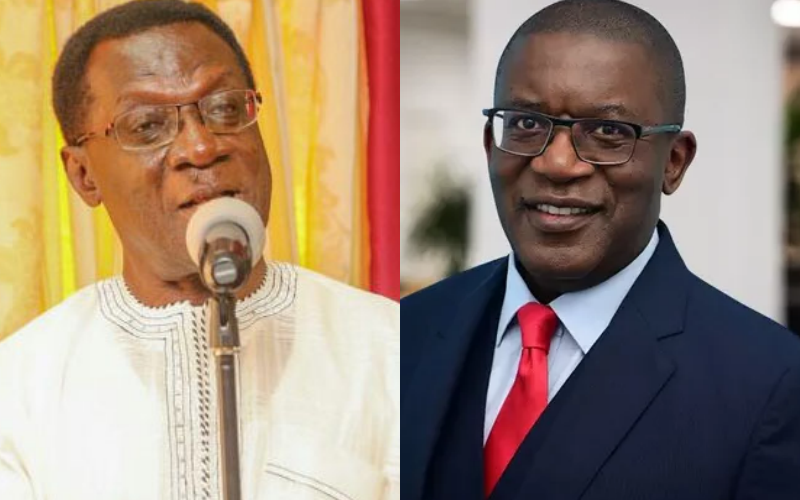The unfolding legal battle against Professor Christopher Ameyaw-Akumfi and Solomon Asamoah, former key figures in the Ghana Infrastructure Investment Fund (GIIF), marks a critical juncture in Ghana’s ongoing struggle with infrastructure development and financial accountability. The charges, centered around the ill-fated Sky Train project, allege a conspiracy to commit a crime and willfully cause financial loss to the state, specifically involving a $2 million payment to Africa Investor Holdings Limited. This payment, purportedly intended for preliminary work on the Accra-based Sky Train system, has come under intense scrutiny due to the complete lack of tangible progress on the project, raising serious questions about the legitimacy of the transaction and the overall management of public funds. This case has reignited the debate on transparency and due diligence within government-led projects, particularly those involving significant public investment.
The Sky Train project, once heralded as a transformative solution to Accra’s crippling traffic congestion, has become a symbol of unfulfilled promises and potential mismanagement. Initially unveiled with considerable fanfare, the project promised a modern and efficient urban transit system aimed at alleviating the daily struggles of commuters in the capital city. The government’s 2019 Memorandum of Understanding with Africa Investor Holdings, signed at the Africa Investment Forum in South Africa, outlined a public-private partnership framework for the project’s implementation. However, the project never advanced beyond the initial stages, leaving behind a trail of unanswered questions about the feasibility studies conducted, the due diligence processes followed, and the ultimate fate of the invested funds. The current legal proceedings against Prof. Ameyaw-Akumfi and Mr. Asamoah now cast a long shadow over the entire endeavor, highlighting the need for greater scrutiny of large-scale infrastructure projects.
The core of the allegations against the two former GIIF officials centers on the unauthorized transfer of $2 million to Africa Investor Holdings Limited. The prosecution argues that this payment, ostensibly for preliminary work on the Sky Train project, was made without proper authorization and constitutes a deliberate misuse of public funds. This raises concerns not only about the specific transaction but also about the broader control mechanisms within the GIIF and the oversight of public investments in general. The absence of any visible progress on the Sky Train project, coupled with the alleged unauthorized payment, fuels suspicions of financial impropriety and underscores the urgent need for transparency and accountability in the management of public resources.
The case against Prof. Ameyaw-Akumfi and Mr. Asamoah has far-reaching implications for Ghana’s development aspirations. It highlights the challenges the country faces in ensuring that ambitious infrastructure projects translate into tangible benefits for the population. The failure of the Sky Train project to materialize, coupled with the allegations of financial mismanagement, erodes public trust in government-led initiatives and underscores the importance of robust oversight mechanisms to prevent the misuse of public funds. This case serves as a cautionary tale about the potential pitfalls of large-scale projects and the crucial need for rigorous due diligence and transparency throughout the project lifecycle.
Beyond the immediate legal ramifications, the Sky Train saga exposes systemic issues within Ghana’s public procurement and project management frameworks. The apparent lack of proper authorization for the $2 million payment raises questions about the internal controls within the GIIF and the effectiveness of oversight mechanisms designed to prevent financial irregularities. The absence of any tangible progress on the project despite the substantial investment further highlights the need for more stringent project monitoring and evaluation processes to ensure that public funds are used effectively and efficiently. This case calls for a comprehensive review of existing procedures to strengthen accountability and prevent future occurrences of similar nature.
The ongoing legal proceedings against Prof. Ameyaw-Akumfi and Mr. Asamoah are not just about the fate of two individuals; they represent a critical test of Ghana’s commitment to transparency and accountability in the management of public resources. The outcome of this case will send a strong signal about the government’s resolve to address corruption and ensure that public funds are used judiciously for the benefit of the citizenry. The Sky Train project, once a symbol of hope for a modern and efficient transportation system, has now become a symbol of the challenges Ghana faces in translating ambitious development goals into reality. This case underscores the urgent need for systemic reforms to strengthen governance, enhance transparency, and promote accountability in all public sector projects.


